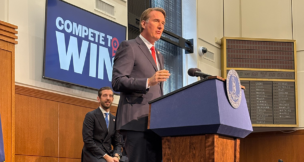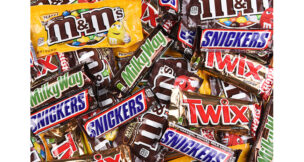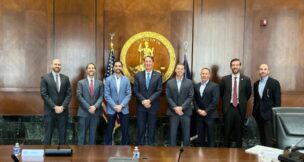No victory lap after winning Amazon marathon
Some observers probably wonder what Montgomery County, Md., could have done differently to land the Amazon headquarters now headed to Arlington.
After all, Montgomery — one of three Washington, D.C., area sites among 20 Amazon finalists — offered the tech giant an incentives package worth up to $8.5 billion.
On top of that, the county had a connection with the Amazon site selection team. Holly Sullivan, Amazon’s head of worldwide economic development, once was president of the Montgomery Business Development Corp.
But Montgomery’s big incentive package was designed to make up for the lead it believed other finalists had in the Amazon marathon.
“One of the reasons Maryland created such a large incentive package for Amazon is because we know our business climate is not as competitive,” Anirban Basu, chairman of the Maryland Economic Development Commission, told The Washington Post.
“We know we need a massive package to attract them,” he said. “Even with that,” Amazon said, ‘Thanks, but no thanks.’ ”
Maryland’s stumbling blocks, in Basu’s estimation, include out-of-date regulations, high business taxes and income taxes at both the state and local level.
Christine Chmura, the CEO of Richmond-based Chmura Economics & Analytics, says that, by 2030, Amazon’s new headquarters will result in the creation of nearly 60,000 jobs and an annual economic impact of $14.2 billion in Virginia.
In winning the Amazon prize, Virginians should be thankful for their good fortune but forgo any self-congratulatory victory lap.
The commonwealth’s ability to compete for major economic development projects was being questioned only two years ago. HQ2 came along at a propitious time when Virginia was beginning to regain its status as one of the best states for business in the nation.
Despite the $573 million package Virginia is offering to Amazon, economic incentives never have been the commonwealth’s strong suit.
Hugh Keogh, the former president of the Virginia Chamber of Commerce, was director of the state’s department of economic development in the late 1980s and early 1990s. In those days, he said, state officials sold Virginia “with a solid dose of boyish charm and an occasional bottle of Virginia Gentleman” whiskey.
Nonetheless, Virginia dominated rankings of the best states for business from 2006 to 2011. The commonwealth was No. 1 for four consecutive years on Forbes’ list and topped the CNBC rankings three times in five years.
But somewhere along the way, Virginia lost its magic touch.
The commonwealth tumbled out of the top 10 ranking as federal budget cuts slowed growth to a trickle. Word also got around that the state’s infrastructure hadn’t kept pace with its horrific traffic congestion, especially in Northern Virginia.
On top of that, the commonwealth’s top economic development organization, the Virginia Economic Development Partnership, suffered a severe blow to its reputation. In 2014, state officials gave a $1.4 million grant to Lindenburg Industry, a Chinese business group promising to turn a vacant building in Appomattox into a factory providing 350 jobs. The factory never opened, and the state is still trying to get its money back.
The Lindenburg fiasco was followed by a scathing 2016 review of the VEDP by the Joint Legislative Audit and Review Commission, the state’s legislative watchdog. It described VEDP as mismanaged and dysfunctional.
The report resulted in the revamping of VEDP and the hiring of Stephen Moret, the former head of Louisiana’s Department of Economic Development, as the Virginia agency’s president and CEO. He came aboard in January 2017.
VEDP and the Virginia Chamber of Commerce also asked Virginia Tech’s Pamplin College of Business to study national business rankings to figure out how the commonwealth could regain its footing as a top-ranked state.
All of this effort helped restore Virginia’s status as a major player in economic development. As if on cue for Amazon’s benefit, Virginia was ranked fourth in the nation this year by CNBC and Forbes.
Virginia business and government leaders, however, should not let the state’s big win cloud their judgment. Just as creating the winning bid for HQ2 required collaboration and investment by many stakeholders, keeping Virginia competitive will require more work.
Back in the days when Virginia was hailed as the nation’s leading state for business, I asked an economic development official if he saw any downside to this recognition. “Yes, I do,” he said. “Complacency. People think, since everything is going so well, they don’t need to do anything.”
When the next big project comes along, it could be Virginia, not Maryland, on the outside looking in if our leaders believe nothing more needs to be done.
i
















